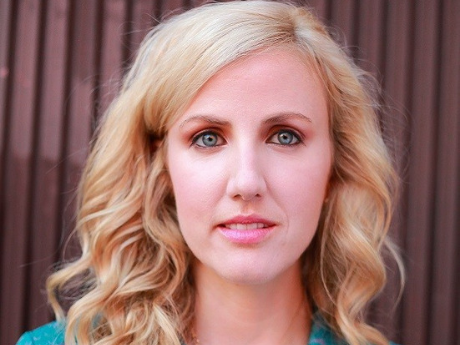In Their Own Words
Libby Burton on “Dreaming the Places My Father’s Tongue Has Been in Summer”

Dreaming the Places My Father's Tongue Has Been in Summer
Those goddamn lonely moments when I address him in the orchard
of his blue eyes, I ask him to tell me one unwholesome thing,
and he deflects. I remember being the only one watching moon color
clinging to shoreline (white hairs flat against my legs.) Somehow
I knew what to notice about the heat of summer crouching in corners,
and there I found a good and satisfying fear. His rugged forehead taught me
to be incandescent with the promise of exception. And still I wish to speak
some loose sentence in the orchard, in the office, in the gliding car: What is love?
Is it piston motion? Is love a warm and quiet mouth? The further shore or exhausted arms?
So I have inherited his tiny throat, squeezing food like a fist. Now home
could be a folding of wings, some calculated sentiment. I remember his hands
holding a map like smoke, my body strapped in the backseat becoming the shape
of a girl, becoming the shape of a spare and exceptional girl.
From Soft Volcano (Saturnalia Books, 2018). All rights reserved. Reprinted with the permission of the author.
On "Dreaming the Places My Father's Tongue Has Been in Summer"
I intended for this title to be provocative, or rather, I embraced the provocation when the title came to me. It's one of those sentences that arrived in my mind fully formed, and it just happened to be rhythmic and mysterious—so I went with that. But it got me thinking: where had my father been? Who has he kissed? Who and what has he loved? And what is my relationship to those people and those places? This is something I'm, admittedly, a bit obsessed with: the weight of direct inheritance. We are physically made out of pieces of our parents, so how do their bodies affect our own?
Inheritance isn't just a loaded term, it's heavy. Heavy with meaning, pain, history, erasure, and so many aspects of American life and culture. This poem looks at the connections between two specific people in a very specific relationship: a father and a daughter and how each of their actions echo in each other, even at the cellular level. It's also about the expectations we place on each other, spoken and otherwise.
For a while, I was embarrassed by the title of this poem. Embarrassed it sounded incestual and that it would give the wrong idea. But over time, I have grown to love it. This evolution from self-consciousness to embrace is a process I have experienced so many times over as I have grown older. Things that once embarrassed me—about myself; about past decisions; wrong things said at the wrong time; past relationships or interactions—are now integral parts of my story. I'm able to look at them squarely and honestly and embody that old cliche: knowing I wouldn't be who I am today without these mistakes and missteps. The same goes for the girl in his poem. She is all the pieces of her father, but it's what she builds with those—what she accepts and rejects—that matters.



